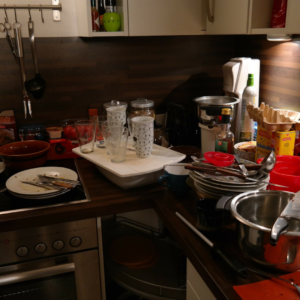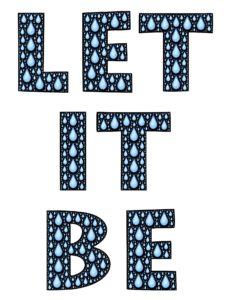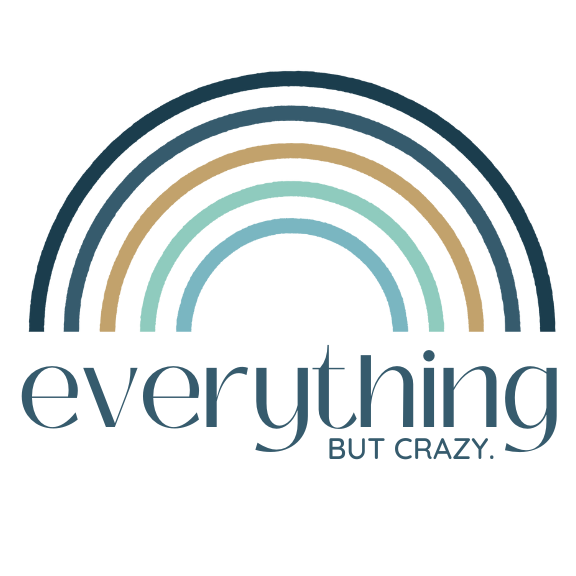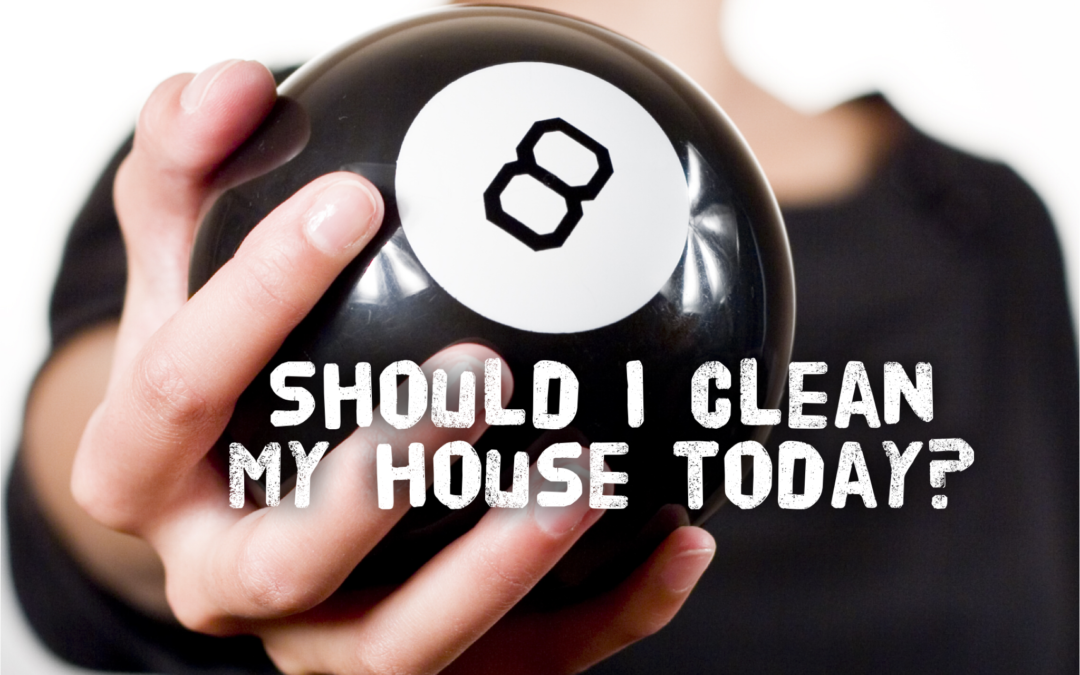You’ve heard that advice before, right? The advice that tells you to prioritize your children and let the house be? The one that encourages you to soak up every minute that you can with those little beings while ignoring all the crap piling up around you? Yah, I’ve heard that advice too. And to an extent I even like it.
Except…
I’m a highly sensitive person (read more about that in So You’re A Sensitive Parent… Now What?). And one of the facets of that personality type is that I’m incredibly impacted by what is going on around me. The noise, the smell, the touch, and yes, everything that’s in my visual field. It can go either way. When the sensory information is pleasing to me, like when I listen to calming music or smell a fresh batch of cookies in the oven, it helps make me feel better. But when the sensory input is unpleasant, like when I have hair that keeps getting in my eyes or my toddler starts screaming, it makes me feel worse. Much, much worse.
So you can imagine that walking into my house and being greeted with STUFF EVERYWHERE, especially when I’m already having a rough day, can send me over the edge. It’s just too much, and my poor nervous system starts hurting.
My husband, on the other hand, doesn’t even see it. When I express my frustration at the little piles of crap stuffed in corners everywhere, he asks, “what crap?” So his advice to me is to just ignore it because, clearly, that works for him.
Oh, I so wish that worked for me! But I can’t just pretend I don’t see what I see. In fact, there’s plenty of research out there that highlights the link between a messy house and depression (for a non-academic, but hilarious and spot-on take of this dynamic, check out the post The Depression/Messy House Cycle in the cheeky blog Unfuck Your Habitat).

The gist of the depression/messy house link is that human beings are affected by our environments. Our surroundings can impact our physical health, due to the presence of pathogens as well as the physiological manifestations of stress (stress is not all in our head– it has very real bodily symptoms such as elevated heart rate, accelerated breathing, fatigue, and muscle tension, just to name a few).
I think most of us parents know all too well how stress can affect our parenting. It leaves us feeling less patient, less playful, and more distracted. No parent likes feeling that way, and no child likes being parented that way.
And our surroundings can also affect our mood. One mechanism for this is via our cognitions, which tend to flow steadily through our minds without us even being aware of them. But even though we may not be conscious of our thoughts, they are still very powerful in shaping our perceptions and our feelings.
So if I walk into my kitchen and the first thought I have is “Damn, this place is a shithole. How am I going to get dinner prepped in time when I have to clear everything off first?” then certainly I’m going to already have an elevated stress level, which will contribute to my anxiety as well as my irritability. Instead of taking 30 minutes, the task of cooking dinner is now going to turn into 60 minutes. I’m probably going to be much shorter with my children, and feel irritated by the task of cleaning up.

And this is why scheduling time to clean and organize your home can actually play a very important role in maintaining a happy household. It can help relieve the stress of the parent and thereby relieve the stress of the child.
I’m sure it feels like I’ve just given you more pressure to keep up a clean home in addition to the ever-powerful driving force of self-image and its goal of preventing shame. The last thing we as parents need is more pressure to do anything! But the reality is we receive two contradictory messages: keep your house pristine at all costs vs. live in a trash can and just pretend you don’t because you have cute babies who will eventually grow into adults.
For most of us, both of these things are priorities. We care very deeply about the way we spend time with and raise our children. But we also care very much about our own mental health. And for some of us, like me, that involves the state of our home.
So let me just put in some qualifiers.
1. Balance
(You knew that was coming, right?!). But balance is key. In the psychological world, we talk about something called black and white thinking. It’s a term for the tendency some people have of trying to put everything in a box, such as good vs bad, and right vs wrong.
In reality, many things in life live somewhere in between those two boxes. So clean is not always better than messy, because you have to consider the costs as well as the benefits.
Is it better to have a pristine house at the expense of spending quality time with your children? Is it better to have a clean house if you are on the verge of collapse and desperately need some self-care? And is it better to spend time with your children if it means you will have new rodent species taking up shelter in your kitchen and feasting off fallen crumbs?

Your job is to take in the information I shared above about the way our environment affects us, and figure out where on the spectrum of helpful vs harmful you are in this moment… and make your decision about how to spend your time from there.
2. You do you
Everyone’s assessment of whether to clean or not to clean is going to differ from each other. That’s because we all have different sensory sensitivities, demands from our children, physical limitations, multitasking capabilities, etc. So just because Suzy down the street decided to deep clean her bathrooms today, does not mean that’s the right choice for you.
And not only are your needs different from those around you, but they also change over time, as well as from moment to moment. So today you might decide it’s worth it to spend some extra time and energy organizing closets, but tomorrow you may decide it’s more important to play hide and seek with your kids.
3. Tolerate what’s left undone
With every choice we make, there is going to be the positive response to what we did accomplish and the negative response to what we didn’t. It’s the yin and yang of life. Because there’s always going to be a path not taken. And there will always be a little buzz in our brains reminding us of what we didn’t do. Instead of trying to pretend that’s not true, it can help by trying to just tolerate this buzz without letting it dictate your actions or your appraisal of your actions.

In the psychology world, this idea is called distress tolerance. Instead of lamenting over our failures or our difficult emotions, which can send us in a downward spiral, we can accept our feelings for what they are and move on.
Am I disappointed I’m not a real-life superhero with turbo-speed multitasking abilities? Of course. But I’m also happy for the quality time I had with my kids laughing over silly noises this afternoon. And I’m also happy that I chose to sort through the over-flowing stack of mail the night before allowing me to see the color of my countertop for the first time in weeks.
I can give in to the pull of that buzzing sound of negativity, or I can acknowledge it’s there and choose to focus on my accomplishments. So, whenever I do get a chance to tackle some of the never-ending to-dos, I will take a few moments when I’m done to stand back and admire the resumed order (because let’s be honest— it’s not going to last!). And whenever I choose to devote my attention to my kids, I am filled up with joy and love and satisfaction at strengthening the bonds with them that will shape their future.
So, next time you wonder, “should I clean my house today?” how will you answer?
____
Dana Basu, PsyD is a licensed clinical psychologist at EverGROW therapy and founder of Everything But Crazy, an online resource for parents. She provides individual therapy, support groups, and online resources for parents in Orange County and throughout the state of California via online therapy. She specializes in working with the highly sensitive person and people with difficult childhood experiences, trauma, parenting stress, and chronic guilt.

